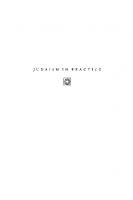The Iberian Qur’an: From the Middle Ages to Modern Times 9783110778847, 9783110778595
Due to the long presence of Muslims in Islamic territories (Al-Andalus and Granada) and of Muslims minorities in the Chr
130 110 123MB
English Pages 558 [560] Year 2022
Table of contents :
Acknowledgements
Table of Contents
The Iberian Qur’an and the Qur’an in Iberia: A Survey
I Latin and the Development of Literal Translation
Robert of Ketton and Mark of Toledo and the Rise and Development of the Literal Translation of the Qur’an
The Qur’an and the ‘Laws of Muḥammad’ in Medieval Christian Eyes
A Mozarabic Qur’an? Some Reflexions on the Evidence
Projecting the Qur’an into the Past. A Reassessment of Juan de Segovia’s Disputes with Muslims in Medina del Campo (1431)
Germanus de Silesia’s Qur’an Translation in the MS K-III-1 of the El Escorial Library: Newly Discovered Revised Versions
II Muslims in Christian Spain: From Arabic to Aljamía
The Office of the Four Chief Judges of Mamluk Cairo and their views on Translating the Qur’an in the Early Sixteenth Century: Iberian Islam in a Global Context
New Models of Qur’an Abridgment among the Mudejars and Moriscos: Copies in Arabic Containing three Selections of Suras
Dialectal Variations in Aljamiado Translations of the Qur’an
Morisco Methods for Memorizing the Qur’an: Fragmentary Copies with the Suras in Reverse Order
The Inquisition and the Search for Qur’ans
III Antialcoranes. Polemicists, Converts, Scholars
Sounding the Qur’an: The Rhetoric of Transliteration in the Antialcoranes
Preaching, Polemic, and Qur’an. Joan Martí de Figuerola’s Lumbre de fe contra el Alcorán
Quoting the Original: Figuerola’s Lumbre de fe and the Arabic Qur’an
Translations from Arabic of Iberian Origin in Egidio da Viterbo’s Qur’an
To Translate is to Interpret: Exegetic Annotations in the Qur’an of Bellús (Valencia c. 1518)
IV Modern Times
Rediscovering the Qur’an in Nineteenth-Century Spain: Allure and Aversion in the Shadow of A. B. Kazimirski’s French Edition
José Filiberto Portillo: Qur’an, Poetry and Exile in the Court of Isabel II
The Qur’an in the Spanish Philippines
Notes on Contributors
Index
Acknowledgements
Table of Contents
The Iberian Qur’an and the Qur’an in Iberia: A Survey
I Latin and the Development of Literal Translation
Robert of Ketton and Mark of Toledo and the Rise and Development of the Literal Translation of the Qur’an
The Qur’an and the ‘Laws of Muḥammad’ in Medieval Christian Eyes
A Mozarabic Qur’an? Some Reflexions on the Evidence
Projecting the Qur’an into the Past. A Reassessment of Juan de Segovia’s Disputes with Muslims in Medina del Campo (1431)
Germanus de Silesia’s Qur’an Translation in the MS K-III-1 of the El Escorial Library: Newly Discovered Revised Versions
II Muslims in Christian Spain: From Arabic to Aljamía
The Office of the Four Chief Judges of Mamluk Cairo and their views on Translating the Qur’an in the Early Sixteenth Century: Iberian Islam in a Global Context
New Models of Qur’an Abridgment among the Mudejars and Moriscos: Copies in Arabic Containing three Selections of Suras
Dialectal Variations in Aljamiado Translations of the Qur’an
Morisco Methods for Memorizing the Qur’an: Fragmentary Copies with the Suras in Reverse Order
The Inquisition and the Search for Qur’ans
III Antialcoranes. Polemicists, Converts, Scholars
Sounding the Qur’an: The Rhetoric of Transliteration in the Antialcoranes
Preaching, Polemic, and Qur’an. Joan Martí de Figuerola’s Lumbre de fe contra el Alcorán
Quoting the Original: Figuerola’s Lumbre de fe and the Arabic Qur’an
Translations from Arabic of Iberian Origin in Egidio da Viterbo’s Qur’an
To Translate is to Interpret: Exegetic Annotations in the Qur’an of Bellús (Valencia c. 1518)
IV Modern Times
Rediscovering the Qur’an in Nineteenth-Century Spain: Allure and Aversion in the Shadow of A. B. Kazimirski’s French Edition
José Filiberto Portillo: Qur’an, Poetry and Exile in the Court of Isabel II
The Qur’an in the Spanish Philippines
Notes on Contributors
Index

- Author / Uploaded
- Mercedes García-Arenal (editor)
- Gerard Wiegers (editor)
![Renaissance Humanism, from the Middle Ages to Modern Times [1° ed.]
1472451546, 9781472451545](https://ebin.pub/img/200x200/renaissance-humanism-from-the-middle-ages-to-modern-times-1nbsped-1472451546-9781472451545.jpg)
![Renaissance Humanism, from the Middle Ages to Modern Times [1 ed.]
1472451546, 9781472451545](https://ebin.pub/img/200x200/renaissance-humanism-from-the-middle-ages-to-modern-times-1nbsped-1472451546-9781472451545-g-7004703.jpg)







